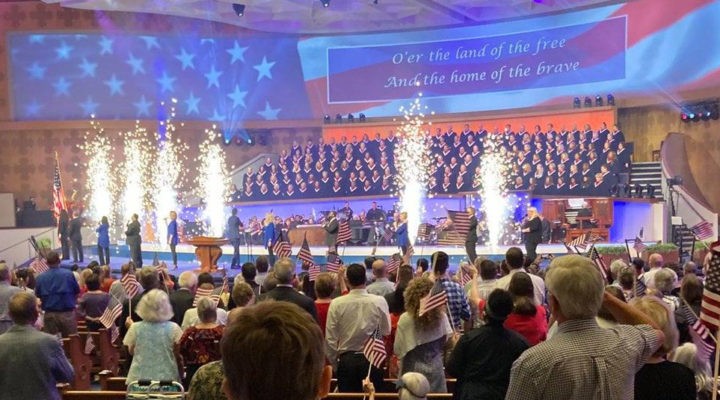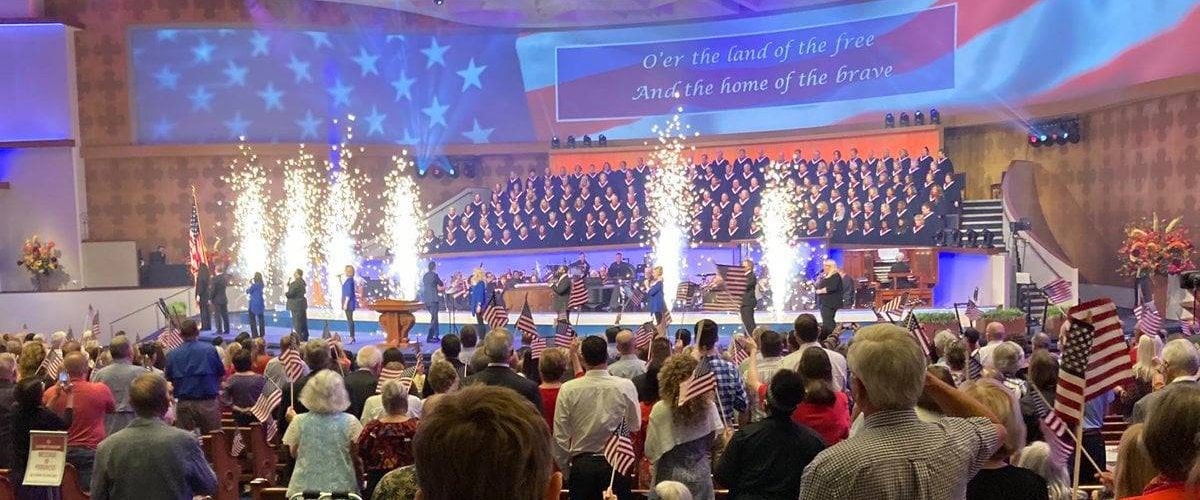As a dog owner, I’m ambivalent at best about fireworks, but I absolutely love a cookout. In fact, I consider myself a connoisseur of all things hotdog, hamburger or potato salad-related and, as a child, I developed abnormally large forearms from hand-churning gallons of homemade ice cream.
All that said, as yet another Fourth of July approaches, I have some confessing to do.
Along the way, I’ve discovered I’m almost entirely unpatriotic. You won’t hear me recite the Pledge of Allegiance. If we’re at a sporting event and you happen to be near me when the “Star Spangled Banner” is played, I’ll stand quietly, not wanting to be needlessly disrespectful of others and their beliefs, but I won’t, myself, salute the American flag. I cringe when I open the church bulletin each year on the Sunday closest to the Fourth of July, dreading the inevitable singing of “My Country ’Tis of Thee” or “God Bless America.” I’ll die a happy man if I never, ever, again hear Lee Greenwood crooning that he’s proud to be an American, ’cause at least he knows he’s free.

Chris Conley
My aversion to all things patriotic doesn’t spring out of any anti-American sentiment, though. While I admittedly have grave concerns about the ways in which our nation, past and present, has failed to live up to its lofty ideals, America is not, for me, the Great Satan. If I knew of a perfect nation, I would live there, and I’m no more likely to salute some other country’s flag than I am to salute the Stars and Stripes.
My problem with patriotism is patriotism, itself. My concern is not one of politics, but of faith. One of conscience.
It is also a concern that is deeply personal. While I know where I feel called to draw the line between country and faith in my own life, I do not claim the right to tell anyone else what they must render unto God, and what they can, instead, safely render unto Caesar. Perhaps there are forms of patriotism that are perfectly appropriate and healthy for other Christians. I don’t know.
I am comfortable saying, though, that in our highly polarized society, patriotism is too often distorted into something that is, by its very nature, dangerous and damaging. Once it is distorted in this way, patriotism and faith become incompatible, and we are inevitably required to lay down the Cross if we wish to raise the flag. In particular, there are three such distortions that may sound good as bumper sticker slogans but should raise serious concerns for any Christian serious about his or her faith.
‘My America: Right or wrong’
In our greed-soaked culture, few words ring truer than Christ’s admonition that nobody can serve two masters and that an attempt to do so will leave us serving one and despising the other (Matthew 6:24). What is true of mammon is equally true of Old Glory.
By way of example, an editorial published in the Dallas Morning News in the immediate aftermath of 9/11 observed that — while not all Christians were pleased with the change — “the American flag has replaced the Cross as the most visible symbol in many churches across the country.” Those same churches joined together on Sunday mornings to belt out “God Bless America,” essentially making America the subject of their worship, and relegating God to a supporting role in a nationalistic pageant performed in God’s own house.
The early church fathers seemed to firmly grasp the truth that such patriotism is not a virtue. It is idolatry. In the words of Saint John Chrysostom, “The believer belongs to no city on earth but to the heavenly Jerusalem.” Or, as put even more succinctly by Clement of Alexandria, “If you enroll as one of God’s people, then heaven is your country and God is your lawgiver.”
Like Justin Martyr centuries before me, I’ve become convinced that, just as God called on Abram to show his faith by leaving his country behind, we, as Christians, also are summoned out of our own nations, called to leave our allegiances to our home countries behind in order to truly live out our faith in God.
“I am a supporter of America only to the extent that her actions are compatible with the values of the kingdom of God.”
As a Christian, I cannot pledge unequivocal allegiance to any nation divorced from a critical and prayerful assessment of its words and deeds. I am a supporter of America only to the extent that her actions are compatible with the values of the kingdom of God. To the extent American policies and conduct instead reflect the values of this world — and show themselves to be motivated not by self-sacrificial love, but by greed or hatred — I must stand as her enemy.
In the words of Pope Leo XIII’s encyclical “Sapientiae Christianae,” when a nation’s laws cannot be squared with the love of God and of neighbor commanded of all Christians, “to resist becomes a positive duty, to obey a crime.”
This was not an abstract debate for the early church. It clung to this great truth of God’s oneness and its demand on their lives, even when it meant the creatively grisly deaths of her martyrs.
Almost two millennia after Constantine, though, we seem to no longer realize that patriotism taken to its extremes is essentially a flag-draped call to pledge an unswerving and unqualified allegiance to one’s nation at the expense of complete faithfulness to God. It demands that we trade loyalty to the one, true, living God for loyalty to something that, in God’s own sight, is less than nothingness, of no more worth than dust (Isaiah 40:15, 17). It is a bargain Christians must not make.
‘America: Love it or leave it’
Even though the Roman Coliseum is now a tourist site, not a torture pit, the “Love it or leave it” variety of patriotism that is once again in style in America poses a threat to the essential calling of the church. Simply put, while a distorted patriotism may seek to silence any and all criticism of our nation as un-American, the church must remain true to its mission to be salt and light. It must commit itself to being the conscience of the land in which it sits, not its mouthpiece.
Too rarely has the church lived into this sacred calling over the years, and the few resulting flashes of brilliance have been world-changing. Sometimes the names are known to us, from William Wilberforce’s tireless dedication to stamping out the British slave trade as un-Christian and inhumane, to Martin Luther King Jr.’s courageous work in the Civil Rights Movement of championing the sacred value and dignity of all of God’s children, to Desmond Tutu’s key role in ending South African apartheid by shining the light of God’s truth into the darkness. Some of the names are not as widely known, such as the scores of Catholic priests and nuns who were willing to stare into the face of Central American death squads in the 1980s in order that they, like Christ, could stand with the poor, the threatened, the oppressed.
“Prophecy, not patriotism, is what is needed from Christians.”
Unfortunately, the impact of the salt and light demanded from the church has perhaps more often been made manifest by its absence. When a church endorses rather than challenges culture, we end up with the swastika-draped altars of the German Evangelical Church or a Southern Baptist Convention formed to give theological cover for an entire society based on the brutal, vicious, enslavement of Black people.
Many Americans today may wish to cover their ears when faithful Christians act out their love of neighbor by crying out for the end of unjust wars, for a comprehensive dismantling of generational wealth inequality, and for true healing of the legacy of slavery and white supremacy that has haunted our land for more than 400 years. For them, patriotism means choosing, instead, to cling to a mythical America as the spotless City on the Hill. America’s churches, however, cannot stand silent and remain the body of Christ. Prophecy, not patriotism, is what is needed from Christians.
‘America first’
These concerns help explain my lack of patriotism, but they do not lie at its heart. There you will find my belief that, increasingly today, what passes as “patriotism” seems grounded in pride and selfishness, demanding that our “us” be viewed as separate and superior to the world’s “others.”
In his excellent and insightful 2005 essay, “Theological Problems with Patriotism in Worship,” Craig M. Watts quoted Hebrew University Emeritus Professor of Philosophy Igor Primoratz’s definition of “patriotism” as being inherently and intrinsically exclusive in that “a patriot loves her country more than any other and is more concerned for the interests of her country and compatriots than for the interest of other countries and their inhabitants.”
“For American Christians to look out at a world filled with brothers and sisters who share our faith but not our nationality and to declare ‘America first’ is nothing less than the defilement of the Eucharist.”
To borrow from Pope Pius XI’s December 1922 Encyclical, “Ubi Arcano Dei Consilio,” patriotism in this debased, nationalistic form provides merely “an added incentive to grave injustice” as “we forget that all men are our brothers and members of the same great human family, that other nations have an equal right with us to both life and to prosperity.”
At its very worst, this grossly distorted form of nationalistic patriotism becomes, in the words of Marcia Baron, “inseparable from hate campaigns,” in which “those who show insufficient hatred (of others) are branded unpatriotic.”
Patriotism in this sense smacks of American exceptionalism, not the gospel. For American Christians to look out at a world filled with brothers and sisters who share our faith but not our nationality and to declare “America first” is nothing less than the defilement of the Eucharist, a denial of the unity of Christ’s children as one body who partakes from one loaf and cup (1 Corinthians 10:17; 11:27). In so doing we deliberately reject the unifying truth of the Holy Spirit so that we can, instead, continue to cling to the diabolical lines we insist on drawing between Jew and Greek, between “us” and “them.”
Perhaps if there is a healthy patriotism left available to Christians, it is one that requires a shift in viewing patriotism — love of nation — not as something we feel, but as something we do. Rather than simply feeling love for America, we should show our love for America by standing true to our faith, calling on America to truly live out the principles she purports to stand for and thus helping reshape our nation in ways that honor our faith and heal our land.
What can be more loving than that?
Chris Conley is an attorney and graduate of the University of Georgia and of the Emory University School of Law. He and his wife, Mary, live in Athens, Ga., where both are members and deacons at First Baptist Church. They have one son, Aaron, who also is an attorney, and a miniature schnauzer, Oso, whose career path remains uncertain.
Related articles:
Patriotism or nationalism? | Opinion by Doyle Sager
I’m a conservative Christian. I’ve got a problem with the flag | Opinion by Scott Collins
Christian nationalism deeply embedded into American life, Tyler warns


